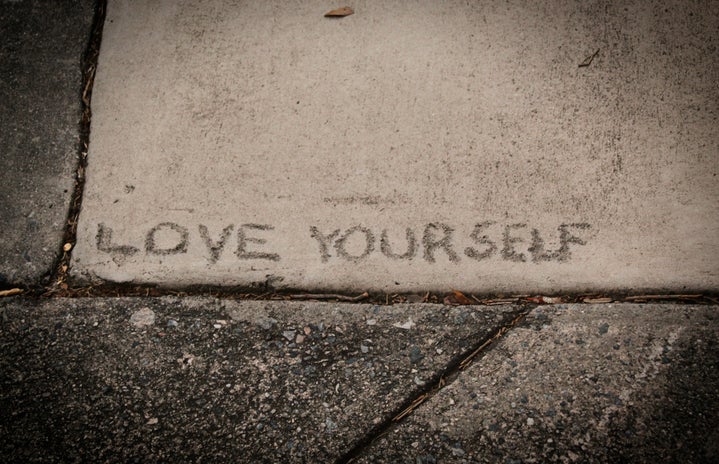If you have been on social media in recent years, you may be familiar with positive affirmations: self-affirming and supportive statements that are meant to challenge negative thoughts, perceptions and attitudes. They range from simple and gentle reminders to prioritize self-care and health to confident statements about life and self-worth. While these messages are often uplifting, optimistic and beautiful, they are also powerful. Repeating and believing affirmations can lead to positive changes and a greater sense of optimism, gratification and contentment in a world that is often negative and overwhelming.
I first discovered positive affirmations a few years ago, and since then it has profoundly changed how I view myself and the messages I try and tell myself. I was at a family gathering, and as the day turned to dusk my cousins and I sat around the fireplace and talked about life and the things we had recently learned. One of my cousins had spent some time focusing on spirituality and meditation, and she spoke about the negativity she had carried with her for so long and how she was reshaping those emotions into something positive and intentional. She said that for so many years she had been constantly lowering her self-worth and telling herself that she was not enough, or that she was not beautiful, or that she could always be better, do more and have more. Subconsciously or during times of self-hatred she repeated these words, and it was only after she began meditation and was actively listening to her mind that she realized all the negative habits she had created.
When she tried to still her mind the negative thoughts came back. To contradict her own perception of her beauty and self-worth was an intentional and difficult effort. She told me something that I will remember forever—why would we contribute to our own negative perceptions of ourselves? Why should we tell ourselves we are ugly, or we are worthless? These words are dangerous. All it takes is a repetition of thought to create a cycle of self-hatred. Looking at my own experience, I had not realized how much negativity I was directing at myself until I had to challenge my habits and reshape my words. It was easier, or perhaps even more comfortable, to tell myself I was ugly than to tell myself I was beautiful. Perhaps I believed the former for too long.
Positive affirmations are not just trivial messages on Instagram, they hold serious psychological and even physical power. As far as emotional health is concerned, positive affirmations can help to reduce negative thoughts (even those that are subconscious or hidden) to try and break up negative thought patterns. They can help us feel happier and increase our own gratitude (they often focus on the little things in life, the everyday things we take for granted). In a world that constantly focuses on the shiny and new and that promotes materialism and consumerism and constant achievements it can be shocking to hear and say these words: “I have enough.” Yet, these words help us change our perspectives and overall feelings of optimism and satisfaction. For so many of us have in so many ways more than enough.
Perhaps shockingly, positive affirmations can help us improve our overall health. A great majority of people will or already have experienced chronic pain, and while there is still much research being conducted about pain, there is an incredibly interesting finding. While it is true that there is communication between the brain and body in times of pain, there is also a theory of pain known as the Gate Control Model. This is the basic idea that there are certain hormones, environmental factors or other stimuli that can intercept pain messages being sent to the brain and subsequently close the pain “gate” before those messages are received. Adrenaline, or epinephrine, is a primary example of this. How many athletes have injured themselves during a game but kept playing, only to later realize the extent of their injuries? It was the excitement and stress of the situation that sends descending signals that “blocked” the pain.
In the same way that the pain gate can be closed, it can also be opened by hormones, stimuli and even negative self-talk. Negative appraisals toward oneself not only increase the stress response but promote negative moods and exacerbate pain. In the same way, positive self-talk can work to close the pain gate and help patients manage their pain. Rather than discouraging words like “I’ll never get better,” words such as “I got through yesterday, so I can get through today,” help to not only increase mood but reduce pain. Positive affirmations are truly powerful.
So, where should you begin with positive affirmations? You can find them just about anywhere on the Internet, on Instagram (check out our Instagram page @hercampus.ku for some inspiration!), and you can even create your own affirmations to be more personal to your own life. Want some ideas? Here are some positive affirmations I found to help you transform your mindset.
“I am enough.”
“Today is a day for change.”
“I possess the qualities that I need to be successful.”
“I am thankful for new experiences.”
“I am healthy, and for that I am grateful.”
“I choose to live in a way that will bring me peace and joy.”
“Times may be difficult, but it is merely a short phase of life. Things can and will get better.”
“I give myself permission to do what is right for me.”
“I trust that I am on the right path.”
Positive affirmations can be powerful, and when used as gentle reminders of gratitude, happiness and health, they can help shape a negative mindset into one of positivity. Take time for yourself, take care of yourself, and remember to believe in yourself because negative self-talk is absolutely damaging and does nothing more than build on insecurity and self-hatred. Be gentle with yourself, and remember that you are beautiful, and who you are right now is enough.


